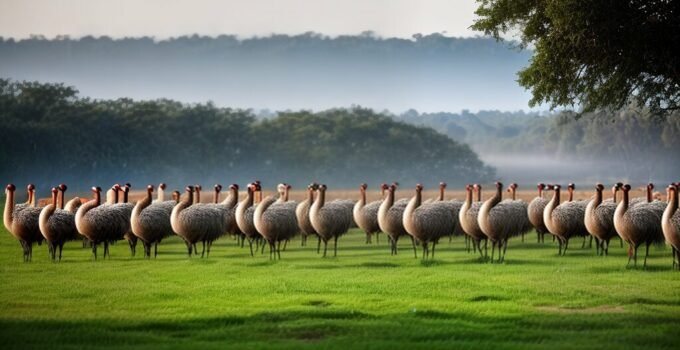Ostriches are fascinating birds that require special attention when it comes to their feeding habits and nutritional needs. It is essential to provide them with a balanced diet that ensures they receive the necessary nutrients for optimal growth and development. In this article, we will explore the natural feeding behavior and preferences of ostriches and provide practical guidelines for their captive feeding. We will also discuss the potential health impacts of poor nutrition and offer solutions to common feeding challenges.
Key Takeaways:
Understanding ostrich feeding habits and nutritional needs is crucial for their optimal health and growth.
Expert guidance and knowledge are necessary for providing the right diet and feeding patterns.
Understanding Ostrich Feeding Behavior
Ostriches are known for their unique feeding behavior, which has evolved over time to suit their natural environment. Understanding their natural feeding behavior is important to ensure optimal health and growth in captivity.
Ostriches are opportunistic feeders, meaning that they will eat a wide variety of food as long as it is available and suits their taste. They forage for food both during the day and at night, usually consuming a mix of plant material and insects. Their diet in the wild typically includes grasses, leaves, flowers, seeds, fruits, and insects.
In captivity, it is important to mimic their natural feeding behavior as much as possible. Ostriches should be fed a varied diet that includes high-quality, nutrient-dense foods such as vegetables, fruits, grains, and protein sources. They should also have access to clean water at all times.
Feeding ostriches in captivity should also take into consideration their feeding preferences and habits. For example, ostriches prefer to feed from the ground, so food should be placed at ground level. They also tend to eat small meals throughout the day, so feeding them several times a day is recommended.
Feeding Guidelines for Ostriches
When feeding ostriches in captivity, it is important to follow these guidelines:
- Provide a varied diet that meets their nutritional needs.
- Feed small meals throughout the day.
- Place food at ground level.
- Ensure access to clean water at all times.
- Monitor their food intake and adjust portions as needed.
By following these guidelines and understanding their natural feeding behavior, ostriches can thrive in captivity and live a long and healthy life.
Ostrich Dietary Preferences
Ostriches are omnivores, meaning that they eat both plants and animals. In the wild, their diet consists primarily of vegetation such as grasses, leaves, and seeds. However, they are opportunistic feeders and will also consume insects, small mammals, and reptiles when available.
It is important to offer a varied diet to captive ostriches to mimic their natural feeding habits and ensure they receive a balanced nutritional intake. This can include a combination of hay, grass, and commercial feed, as well as occasional treats such as fruits and vegetables.
| Dietary Component | Examples |
|---|---|
| Protein | Insects, meat, fish, eggs, soybeans |
| Carbohydrates | Grass, hay, corn, oats, wheat |
| Fats | Nuts, seeds, fish oil, canola oil |
| Vitamins | Carrots, sweet potatoes, leafy greens, fruits, fortified commercial feed |
| Minerals | Calcium, phosphorus, iron, zinc, copper, salt |
It is recommended to consult with a veterinarian or experienced ostrich breeder to determine the appropriate diet and feeding schedule for captive ostriches, as individual needs may vary based on age, activity level, and other factors.
Nutritional Requirements for Ostrich
Proper nutrition is vital for the health and growth of ostriches. To meet their nutritional needs, ostriches require a balanced diet consisting of various essential nutrients, including proteins, carbohydrates, fats, vitamins, and minerals.
| Nutrient | Function | Recommended Daily Intake* |
|---|---|---|
| Protein | Building blocks for muscle, feathers, and other tissues | 14-18% |
| Carbohydrates | Source of energy | 50-60% |
| Fats | Source of energy, insulation, and protection of organs | 4-6% |
| Vitamins | Support various body functions, including growth and immune system | Depends on the vitamin |
| Minerals | Support various body functions and play a vital role in skeletal growth and development | Depends on the mineral |
*Recommended daily intake guidelines may vary depending on age, activity level, and other factors.
It is important to note that ostriches have specific nutritional requirements that differ from other birds. Therefore, it is crucial to ensure that their diet meets their unique needs to avoid health problems and promote optimal growth and development.
Feeding Patterns of Ostriches
Ostriches have a unique feeding pattern that has evolved to suit their natural environment. In the wild, they typically forage for food in the early morning and late afternoon, avoiding the midday heat when they rest in the shade. Their diet consists of a variety of plants, seeds, insects, and small animals such as lizards and rodents.
When kept in captivity, ostriches should be provided with a diet that mimics their natural feeding pattern as much as possible. This means feeding them twice a day, once in the morning and once in the late afternoon, when the temperatures are cooler.
The meal size should be adjusted based on the age, weight, and activity level of the ostriches. Young ostriches require more frequent smaller meals, while adults can handle larger portions. Overfeeding should be avoided to prevent obesity and related health issues.
Factors Affecting Feeding Patterns
The feeding patterns of ostriches can be influenced by several factors such as season, climate, and activity level. For instance, during the breeding season, males may fast for several days while courting females. During cold weather, ostriches may require more food to maintain body temperature.
It is important to observe and understand the feeding patterns of your ostriches in order to identify any changes or abnormalities. Deviations from their natural feeding habits may indicate health problems or stress.
Essential Food Components for Ostriches
Providing a balanced diet that meets the nutritional needs of ostriches is crucial for their optimal health and growth. To achieve this, there are several essential food components that must be included in their diet:
| Component | Importance | Examples of suitable food sources |
|---|---|---|
| Protein | Essential for muscle development and growth | Lean meats, fish, eggs, beans, lentils |
| Fiber | Helps with digestion and prevents digestive problems | Hay, straw, fresh greens, vegetables, fruits |
| Vitamins and minerals | Important for overall health, immune function, and growth | Dark leafy greens, carrots, sweet potatoes, berries, nuts, seeds |
In addition to these components, it is also important to avoid feeding ostriches foods that are harmful to them, such as processed foods, sugary treats, or foods high in sodium or fat.
Note: Providing a varied diet that includes different types of protein, fiber, vitamins, and minerals is essential to ensure that ostriches receive all the necessary nutrients they need for optimal health.
Feeding Ostriches in Captivity
Feeding ostriches in captivity requires careful planning to ensure that they get the right balance of nutrients for their optimal health and growth. Here are some guidelines to follow:
| Aspect | Guidelines |
|---|---|
| Feeding Schedule | Establish a consistent feeding schedule and stick to it to maintain regular eating habits. Feed ostriches at least twice a day, and maintain a gap of at least 6 hours between meals. |
| Portion Size | Offer measured, balanced portions to avoid overfeeding. The portion size should not exceed 2% of their body weight per day. |
| Meal Planning | Plan meals to include a balanced mix of high-quality proteins, vitamins, minerals, and fiber-rich foods. Provide a variety of food types to cater to their natural dietary preferences and meet their nutritional requirements. Include supplements or fortified feeds if necessary. |
| Food Presentation | Present food in a clean, accessible manner to encourage healthy eating habits. Provide clean drinking water at all times. |
| Monitoring | Monitor their food intake closely to ensure that they are consuming the right nutrients. Keep track of their weight and adjust their meals accordingly. Observe their behavior and fecal matter to detect any signs of digestive distress or nutritional deficiencies. |
Following these guidelines can help prevent common feeding problems such as picky eating, overfeeding, and inadequate nutrient intake. By providing a healthy and balanced diet, you can ensure the overall well-being of your ostriches and promote their longevity.
Ostrich Feeding Challenges and Solutions
Feeding ostriches can sometimes be challenging, and owners may encounter feeding-related difficulties that require solutions. Here are some common issues and their possible solutions:
Picky Eating
Some ostriches may be picky eaters, which can lead to inadequate nutrient intake. To encourage them to try new foods, owners can try mixing new foods with their familiar diet gradually. Alternatively, changing the food presentation, such as offering foods in different shapes or forms, may stimulate their appetite.
Inadequate Nutrient Intake
If an ostrich is not getting the necessary nutrients from their diet, it can affect their growth, immune system, and overall health. Owners should ensure they are meeting the ostrich’s daily nutritional requirements and provide a balanced and varied diet. Offering high-quality feeds or supplements can also help to fill any gaps in their nutrition.
Overfeeding
Overfeeding can lead to obesity and related health problems in ostriches. Owners should establish portion sizes and a feeding schedule, and monitor their bird’s food intake closely. Offering a diet rich in fiber and protein but low in fat can also help to promote healthy weight management in ostriches.
Finally, it is important to consult with experts when encountering any feeding-related difficulties or to get advice on best practices. Ostriches rely on proper nutrition for their growth and wellbeing, and owners must ensure that their diet meets their nutritional needs.
Health Impacts of Poor Nutrition
Proper nutrition is crucial for the overall health and wellbeing of ostriches. Inadequate diets can result in a host of health problems that can affect their immune system, growth, and reproductive abilities, and ultimately shorten their lifespan.
The lack of essential nutrients like vitamins and minerals can lead to various deficiencies that can cause health issues in ostriches. Deficiencies in Vitamin E, for example, can result in muscle degeneration and weakness. At the same time, a lack of Vitamin A can cause developmental problems in chicks and result in less resistance to infections. Similarly, a deficiency in calcium can cause osteoporosis in ostriches, affecting their bone density and leading to fractures.
Overfeeding, on the other hand, can also cause health issues in ostriches. Obesity is a common problem faced by ostriches in captivity. When ostriches consume more food than their body requires, the excess nutrients are stored as fat, leading to obesity and other problems like joint pain, gastrointestinal problems, and heart disease.
It is, therefore, essential to provide ostriches with a balanced diet that meets their nutritional needs and to monitor their food intake to prevent health issues related to overfeeding.
Nurturing Optimal Ostrich Growth
Providing a balanced diet is essential for promoting healthy growth rates and skeletal development in ostriches. As a flightless bird, they require sufficient nutrients to withstand their weight and size, making proper nutrition a crucial aspect of their growth journey.
To ensure optimal growth, it is important to provide a diet that includes high-quality proteins, fiber-rich foods, and essential vitamins and minerals. The right balance of nutrients is critical to support the development of strong bones and healthy muscle mass.
| Essential components | Suitable sources |
|---|---|
| Proteins | Meats, fish, legumes, and insects |
| Fiber | Fruits, vegetables, and hay |
| Vitamins and minerals | Supplements, fortified feeds, and natural sources like leafy greens and grains |
It is crucial to provide the right amount of food based on their age, weight, and activity level. Overfeeding can lead to obesity and other health problems, while underfeeding can result in stunted growth and malnutrition. A balanced meal plan with proper portion sizes and a feeding schedule can help ensure they receive the right amount of nutrients for their optimal growth.
Starting with the right nutrition from an early age is also essential for their overall wellbeing in the long term. Proper nutrition can help prevent common health issues and promote a strong immune system, enhancing their lifespan and quality of life.
Conclusion
Understanding ostrich feeding habits and nutritional needs is crucial for their optimal health and growth. By providing proper guidance, owners can ensure the right diet and feeding patterns for their birds. Through this article, readers have learned about ostrich feeding behavior, dietary preferences, nutritional requirements, and feeding patterns, along with practical guidelines for feeding ostriches in captivity and addressing common feeding challenges.
It is important to provide ostriches with a varied diet that meets their nutritional requirements. Including high-quality proteins, fiber-rich foods, and essential vitamins and minerals is essential for their overall health. Proper portion sizes, balanced meal planning, and food presentation can also promote healthy eating habits and ensure optimal growth rates.
Poor nutrition can have negative health impacts, including immune system deficiencies, inhibited growth, and reproductive problems. Providing the right nutrition from an early age is crucial for their overall well-being and longevity.
Readers are encouraged to seek expert guidance and implement appropriate feeding practices to ensure the well-being of these fascinating birds. By nurturing their feeding habits and meeting their nutritional needs, owners can help ostriches thrive and lead healthy lives.
FAQ
Q: What are some common ostrich feeding habits?
A: Ostriches are herbivores and primarily feed on plants, grasses, and seeds. They also have a tendency to swallow small stones or grit, which aids in their digestion.
Q: What are the nutritional needs of ostriches?
A: Ostriches require a balanced diet that includes high-quality proteins, carbohydrates, healthy fats, vitamins, and minerals to support their overall health and growth.
Q: How often should ostriches be fed?
A: Ostriches should be fed daily, with smaller meals offered multiple times throughout the day. The exact feeding frequency may vary depending on factors such as age, season, and activity level.
Q: What types of food should be included in an ostrich’s diet?
A: An ostrich’s diet should consist of a variety of plant-based foods, including grasses, leaves, fruits, and vegetables. It is essential to offer a balanced and varied diet to meet their nutritional requirements.
Q: What are the health impacts of poor nutrition in ostriches?
A: Poor nutrition can lead to a weakened immune system, stunted growth, reproductive problems, and overall poor well-being in ostriches. Meeting their nutritional needs is crucial for their overall health and longevity.
Q: How can I ensure optimal growth in ostriches?
A: Providing a balanced and nutrient-rich diet from an early age is essential for optimal growth in ostriches. Proper nutrition plays a significant role in skeletal development and overall well-being.
Q: What are some common challenges in feeding ostriches?
A: Ostrich owners may face challenges such as picky eating, inadequate nutrient intake, or overfeeding. It is important to implement strategies to address these issues and promote healthy eating habits.
Q: How can I feed ostriches in captivity?
A: Feeding ostriches in captivity involves proper portion sizes, balanced meal planning, and food presentation. Implementing a feeding schedule and monitoring their food intake can ensure their overall health.
Q: Why is expert guidance important in ostrich feeding?
A: Expert guidance is crucial in understanding ostrich feeding habits and meeting their nutritional needs. Professionals can provide valuable advice on diet planning and help address any feeding-related difficulties.
Q: How should I address feeding-related difficulties in ostriches?
A: It is important to address feeding-related difficulties by offering suitable food choices, promoting healthy eating habits, and seeking professional advice. Solutions can be tailored to the specific needs of each ostrich.
Q: Why is it important to understand ostrich feeding behavior?
A: Understanding ostrich feeding behavior allows owners to mimic their natural feeding patterns and preferences, promoting their overall health and well-being. It also helps ensure they receive the necessary nutrients in captivity.



